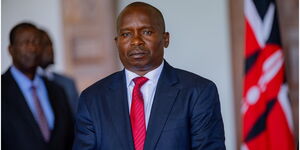Treasury Cabinet Secretary John Mbadi was on Wednesday, March 5, put to task to explain what his docket was doing to address the pressing funding challenges facing the Social Health Authority (SHA).
Appearing before the Senate, Mbadi was challenged by Kakamega Senator Boni Khalwale who wanted to know what the government was doing to mitigate the pressing issue of sustainability and transparency of SHA funding.
The CS admitted that SHA has had its challenges since its rollout in October 2024 but claimed that the challenge mainly revolved around the implementation of the system. "There is no country that has implemented it without politics, even in developed democracies," he said. "As a country, we promised Universal Health Coverage (UHC) and we must implement it properly."
On what the Treasury was doing to support SHA, Mbadi said his docket was working on a more rationalized budget, adding that money was already set aside for the new healthcare system.
He added, "Treasury has supported SHA. In the current supplementary II (budget), we have an allocation of Ksh6 billion to support SHA, Ksh3 billion to support primary health care, and another Ksh3 billion to support critical healthcare.
Further, Mbadi also denounced the notion that SHA was a form of tax, instead describing it as insurance which was removed from the country's fiscal framework, meaning the fund was not part of the government expenditure.
"The deduction from members is insurance. If we take the best case scenario, if no Kenya stays sick, that money will stay there," Mbadi clarified.
The discussion came in the wake of Auditor General Nancy Gathungu's report which exposed a worrying a worrying trend - that 2.5 per cent of member contributions to SHA were being deducted and deposited into an escrow account that lacked transparency and proper oversight.
She further highlighted that the SHA project continues to face numerous challenges, including uncompetitive procurement processes, a lack of payment agreements, and unfavourable contract clauses.
The AG's report led to increased calls from stakeholders, including leaders and the public, for the cancellation of the SHA deal and further scrutiny of the project's governance and financial management.
As far as funding constraints in the new healthcare system were concerned, healthcare officials, led by Director General of Health Dr Patrick Amoth, highlighted the financial troubles, which were blamed on Kenyans who were not contributing to the scheme.
Amoth observed that out of the 19.4 million Kenyans registered on SHA, only a mere 3.3 million were contributing to the scheme.












